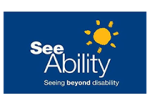SeeAbility, the national sight loss and disability charity, has been shortlisted for two prestigious eye care awards and we need your help by voting for us.
We are one of three finalists in not only the category of Charity of the Year in the Association of Optometrists (AOP) Awards, but also for Lisa Donaldson as Optometrist of the Year. Members of the public can cast their vote by visiting www.aop.org.uk/awards before midnight on Sunday 18 December.
The Awards, now in their sixth year, recognise the highest levels of achievement in UK optics. The Charity of the Year accolade celebrates innovative and successful initiatives from the past 12 months, which encompass either a lead on research, education, strong campaign work or profile-raising activities within the area of eye health. The Optometrist of the Year accolade celebrates practitioners who have combined a commitment to patient care with hands-on clinical expertise while also playing a key role in initiatives designed to support the profession.
Serious sight problem is 28 times more likely in children with learning disabilities
SeeAbility, with Lisa Donaldson as our Clinical Lead, has been running the UK’s largest research study and sight testing programme in special schools since 2013. We found children with learning disabilities are a staggering 28 times more likely to have a serious sight problem than other children, but over four in ten pupils had no history of sight tests or eye care. We have so far carried out over 1,000 sight tests in nine special schools.

Brandon (pictured above with Lisa) is 17 years old and is on the autism spectrum. He is largely non-verbal, has a learning disability and goes to The Village School, a special school in North London.
We gave Brandon his first ever sight test when he was 16 and found that he could see very little with his right eye. If Brandon had received treatment involving prescribed glasses and patching before the age of seven, he might be able to see perfectly today.
“It was a real shock to hear what SeeAbility had found,” says Louise, Brandon’s mother. While we can do nothing but support Brandon and his family, we have been able to dramatically improve the lives of other children at special schools.
If you are concerned about the vision of a child with disabilities, where can you go for help?
If a child has a paediatrician, talk to them about any concerns. S/he can then make an appropriate referral for the child to be seen by the most appropriate specialist.
A child does not need to be able to read, speak or even communicate for it to be possible to check vision and eye health. If a child cannot name or match letters, pictures or symbols their level of vision can still be assessed by observing their responses to people, objects and pictures.
We want to see sight testing available in every special school. It is a safe and familiar environment for the child and avoids unnecessary visits to the hospital for routine eye care.



















